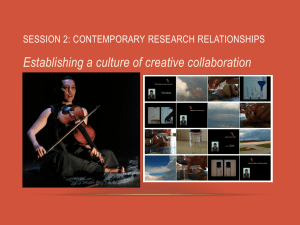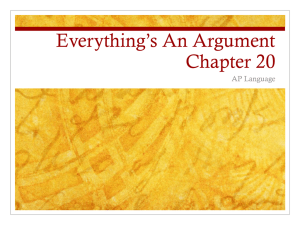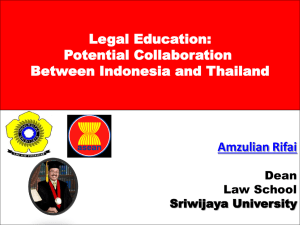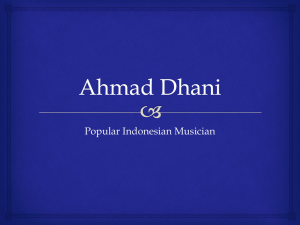Indonesia - G20 2014
advertisement
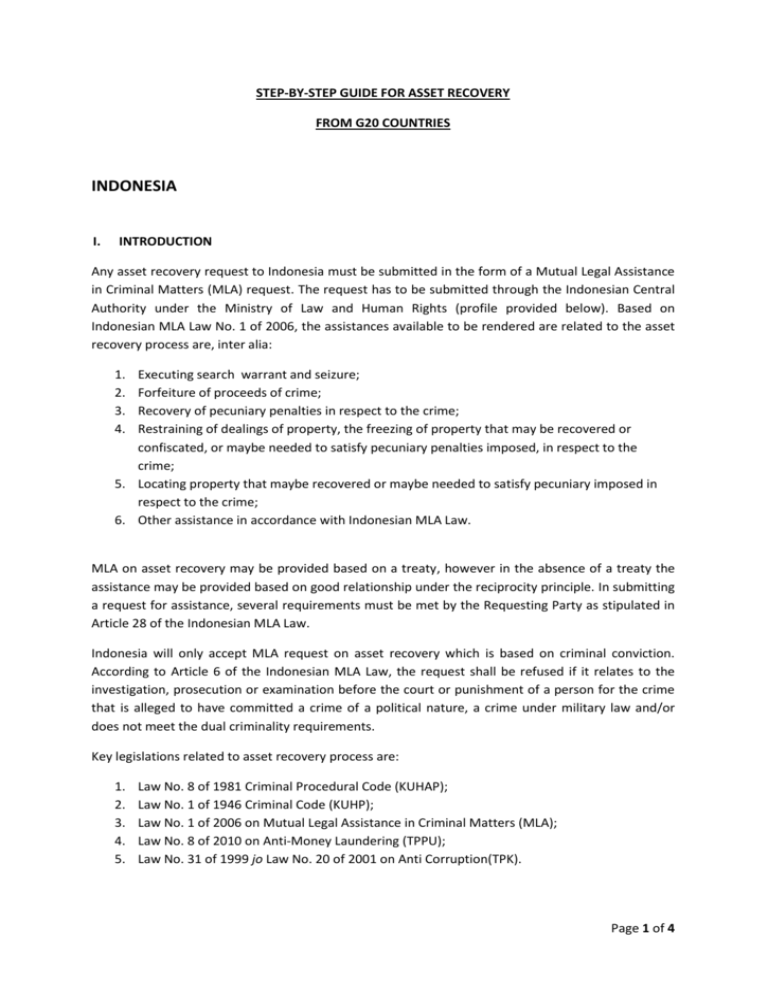
STEP-BY-STEP GUIDE FOR ASSET RECOVERY FROM G20 COUNTRIES INDONESIA I. INTRODUCTION Any asset recovery request to Indonesia must be submitted in the form of a Mutual Legal Assistance in Criminal Matters (MLA) request. The request has to be submitted through the Indonesian Central Authority under the Ministry of Law and Human Rights (profile provided below). Based on Indonesian MLA Law No. 1 of 2006, the assistances available to be rendered are related to the asset recovery process are, inter alia: 1. 2. 3. 4. Executing search warrant and seizure; Forfeiture of proceeds of crime; Recovery of pecuniary penalties in respect to the crime; Restraining of dealings of property, the freezing of property that may be recovered or confiscated, or maybe needed to satisfy pecuniary penalties imposed, in respect to the crime; 5. Locating property that maybe recovered or maybe needed to satisfy pecuniary imposed in respect to the crime; 6. Other assistance in accordance with Indonesian MLA Law. MLA on asset recovery may be provided based on a treaty, however in the absence of a treaty the assistance may be provided based on good relationship under the reciprocity principle. In submitting a request for assistance, several requirements must be met by the Requesting Party as stipulated in Article 28 of the Indonesian MLA Law. Indonesia will only accept MLA request on asset recovery which is based on criminal conviction. According to Article 6 of the Indonesian MLA Law, the request shall be refused if it relates to the investigation, prosecution or examination before the court or punishment of a person for the crime that is alleged to have committed a crime of a political nature, a crime under military law and/or does not meet the dual criminality requirements. Key legislations related to asset recovery process are: 1. 2. 3. 4. 5. Law No. 8 of 1981 Criminal Procedural Code (KUHAP); Law No. 1 of 1946 Criminal Code (KUHP); Law No. 1 of 2006 on Mutual Legal Assistance in Criminal Matters (MLA); Law No. 8 of 2010 on Anti-Money Laundering (TPPU); Law No. 31 of 1999 jo Law No. 20 of 2001 on Anti Corruption(TPK). Page 1 of 4 II. HOW TO SEEK RESTRAINT, SEIZURE AND FORFEITURE/CONFISCATION FROM INDONESIA In order to seek the restraint, seizure and forfeiture/confiscation of criminal proceeds from Indonesia, the following steps should be followed: 1. IDENTIFICATION OF THE ASSET In order to assist identification of assets in Indonesia, the following mechanisms are available: For identifying and locating assets located in Providers of Financial Services (PFS) and other goods and/or services provider (refer to art. 17 AML Law), a request must be sent to all financial institutions upon investigation. (In 2010, Indonesia has enacted a new Anti-Money Laundering Law (AML), which authorizes investigators from the Attorney General’s office, Indonesian National Police (INP), Anti Corruption Commission, National Drugs Agency, Directorate General of Tax, and Directorate General of Customs and Excise to investigate money laundering. In addition, the AML Law allows investigators to request information concerning the suspect’s wealth from PFS. In requesting and collecting records of such information, financial transactions secrecy provisions are not applicable. In addition, the Criminal Procedures Code confers investigators the authority to obtain/request a court order, request hard copies of transaction documentation from bank accounts upon obtaining permission from the Central Bank. In 2014, Indonesia FIU has developed an Integrated Customer Information System which contains specific information (profiles) of financial service provider customers, but not including their balance and transaction information. This Integrated Customer Information system will be useful in tracing assets ownership in financial system. For identifying real estate, landowners’ registration/deed registration with the National Land Agency is mandatory, real estate salesperson need no license in order to conduct a real estate transaction, and the beneficial owner is not disclosed in real estate transactions and such identity can be easily hidden behind legal structures. FIU Regulation PER-10/1.02.1/PPATK/09/11 obligates reporting parties of other goods and/or service providers to identify any beneficial owners, including among others real estate agents, motor vehicle,, diamond and art traders. The identification of beneficial owners is useful in identifying the natural person who ultimately controls or owns the asset. For identifying companies, a registry exists at national level and maintained by the Direktorat Jenderal Administrasi Hukum Umum, Kementerian Hukum dan Hak Asasi Page 2 of 4 Manusia (Directorate General of Legal Administrative Affairs, Ministry of Law and Human Rights) 2. CONFISCATION OF PROPERTY RELATING TO FOREIGN OFFENCES a. Freezing The request to freeze a bank account can be made informally to the Indonesian Financial Transaction Reports and Analysis Center/INTRAC (Indonesian FIU)and the Indonesian National Police (INP). According to the Indonesian AML Law, the Indonesian FIU can temporarily freeze financial transactions of a bank account for a maximum of 20 (twenty) working days. For the purpose of investigation, prosecution and trial Indonesian investigators, prosecutors and judges can order to freeze any assets related to money laundering offences for a maximum of 30 (thirty) working days; b. Seizure, restraining or confiscation assets The request to seize, restrain, or confiscate any assets in Indonesia has to be made through a MLA request. The requirements are defined in article 28 and 41 of the Indonesian MLA Law. The request must also enclose the seizure warrant issued by the authorized institutions in the Requesting Party; c. In the matter of execution of foreign confiscation order, the Requesting Party may request through a MLA such as: confiscation and forfeiture of assets, imposition of penalties, or payment of compensation. The requirements are stipulated in article 28 and 51 of the Indonesian MLA Law. The request must also include the description of said assets, location of assets, certificate of ownership; d. If all the requirements have been met, the request will be directed to the Indonesian Attorney General Office (AGO) who will seek for a Court Decisions on confiscation of the said assets. The owners of the confiscated assets may object to the court decision within 3 (three) months following the notifications such seizure or confiscation. Other third parties may also file an objection or challenge the court issuing the seizure warrant by no later than 6 (six) months following the announcement. e. If there are no challenges or objections in the said period of time the court may issue and order to seize such assets based on the request of the AGO. 3. DISPOSAL/RETURN OF ASSETS The Indonesian Central Authority will notify the requesting party regarding the progress of the seizure. The delivery or return of assets will be decided based on further negotiation or agreement between Indonesia and requesting party. III. ASSET RECOVERY AGENCY/ AGENCIES – CONTACT INFORMATION Page 3 of 4 Based on Indonesian MLA Law, Central Authority for asset recovery process is The Minister of Law of Human Rights. Documents and letters of request to Indonesia for MLA under the MLA law may be submitted to : H.E. Minister for Law and Human Rights Directorate General of Legal Administrative Affairs Jl. H.R. Rasuna Said Kav. X-6 Jakarta 12940 Indonesia Telephone +62 21 520 23 91 Facsimile +62 21 526 10 82 The Technical Unit under Directorate General for Legal Administrative Affairs deals with legal assessment, drafting, and communication: Directorate of International Law and Central Authority Jl. H.R. Rasuna Said Kav. X-6 Immigration Building, 6th Floor Jakarta 12940 Indonesia Telephone +62 21 522 1619 Facsimile +62 21 526 3996 Email: otoritaspusat@kemenkumham.go.id, dir.hi@djahu.kemenkumham.go.id The Indonesian AGO has actively participated in CARIN (Camden Asset Recovery Interagency Network). The Indonesian AGO holds the presidency of ARIN AP (a CARIN type informal network for Asia and the Pasific countries) for 2014. The Indonesia Financial Transaction Reports and Analysis Center (INTRAC) is a member of the EGMONT Group. IV. OTHER USEFUL REFERENCES Requesting countries are encouraged to refer to Directorate General of Legal Administrative Affairs website at http://portal.ahu.web.id/hukum-internasional-otoritas-pusat for additional guidance on making asset recovery requests to Indonesia Page 4 of 4


